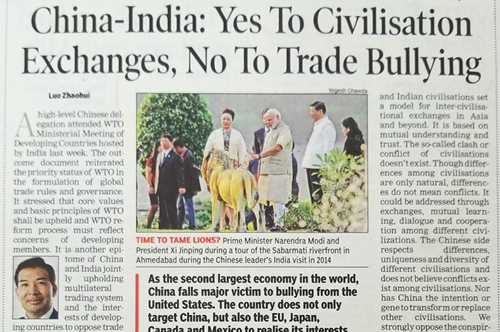
2019年5月25日,驻印度大使罗照辉在《印度时报》发表署名文章《中印携手对贸易霸凌说不,为文明对话喝彩》,强调中印作为古老东方文明,应共同拥抱文明的百花齐放,基于相互理解和相互信任深化文明间交流互鉴与对话合作,共同应对逆全球化、单边主义、贸易保护主义等挑战,反对贸易霸凌,推动合作共赢,维护多边贸易体制和发展中国家利益,携手打造亚洲世纪,构建新型国际关系和人类命运共同体。文章全文如下:文章源自英文巴士-https://www.en84.com/7093.html
文章源自英文巴士-https://www.en84.com/7093.html
On May 25th, 2019, Chinese Ambassador to India H.E. Luo Zhaohui published an article “China-India: Yes to Civilization Exchanges, No to Trade Bullying” in Times of India, pointing out that as ancient eastern civilizations, China and India should deepen civilization exchanges, mutual learning and dialogue based on mutual understanding and trust, jointly address challenges in global governance such as anti-globalization, unilateralism and trade protectionism, uphold multilateral trading system and oppose trade bullying, build an Asian Century, a new type of international relations and a community with shared future for mankind. The full text is as follows:文章源自英文巴士-https://www.en84.com/7093.html
文章源自英文巴士-https://www.en84.com/7093.html
中印携手对贸易霸凌说不,为文明对话喝彩文章源自英文巴士-https://www.en84.com/7093.html
China-India: Yes to Civilization Exchanges, No to Trade Bullying文章源自英文巴士-https://www.en84.com/7093.html
上周,印度召集世贸组织发展中成员小型部长会,中国高级代表团出席。会议成果文件重申世贸组织在全球贸易规则制订和治理中的优先地位,维护世贸组织的核心价值和基本原则,并确保改革进程反映发展中成员诉求。中印一道维护多边贸易体制和发展中国家利益,是两国反对贸易霸凌、合作共赢又一缩影。文章源自英文巴士-https://www.en84.com/7093.html
文章源自英文巴士-https://www.en84.com/7093.html
A high-level Chinese delegation attended the WTO Ministerial Meeting of Developing Countries hosted by India last week. The outcome document reiterated the priority status of WTO in the formulation of global trade rules and governance. It stressed that core values and basic principles of WTO shall be upheld and WTO reform process must reflect concerns of developing members. It is another epitome of China and India jointly upholding multilateral trading system and the interests of developing countries to oppose trade bullying and achieve win-win cooperation.文章源自英文巴士-https://www.en84.com/7093.html
文章源自英文巴士-https://www.en84.com/7093.html
英国经济学家麦迪逊的研究表明,在过去两千多年中,中印两国经济总量占全球50%的时间长达1600年。但近代以来,中印饱受霸权主义、“炮舰外交”之苦。起于上世纪末的新一轮全球化浪潮及多边贸易体制,为中印融入世界经济提供了宝贵历史机遇。中印互学互鉴,在经济治理、政策对接、产业合作等领域开展务实合作,经济快速腾飞,综合国力不断增强,国际影响力显著扩大,民族复兴指日可待。
According to research of British economist Angus Maddison, over the past 2000 years, the GDP of China and India combined had accounted for 50% of the world’s total for as long as 1600 years. Since modern times, both China and India suffered from hegemonism and “gunboat diplomacy”. The new round of globalization as well as multilateral trading system originating from the end of 20th century provided valuable historical opportunities for China and India to integrate into world economy. China and India have been learning from each other and conducted practical cooperation in areas such as economic governance, policy synergy and industrial cooperation. China and India’s economies continue to be booming, and the comprehensive national strength of the two continues to increase and global influences to expand significantly. The national rejuvenation of China and India is within reach.
然而,前进的道路从来不会一帆风顺。当前贸易保护主义大行其道,新兴经济体不断承受某个发达国家的挤压、敲打甚至遏制。他们“唯我独尊”,一意孤行,祭出“退群”、毁约、“关税大棒”、封杀、制裁等新“法宝”。他们不顾国际信用,极限施压,出尔反尔,攫取最大利益。同时鼓吹“本国利益优先”,鼓噪东西方、白人与非白人间的“文明冲突”,煽动种族主义情绪。
However, the way forward will never be smooth. Against the backdrop of surging trade protectionism, emerging economies have been constantly pressurized, bullied or even contained by a certain developed country, which seeks supremacy and is determined to act willfully. It resorts to new “magic weapons”, such as withdrawing from international organizations, abrogating agreements, wielding sticks of tariffs, creating blockage and imposing sanctions. Disregarding its international credibility, it seeks utmost self-interests through extreme pressure and breaching promises. It advocates “Self-interests First”, clamours for the “clash of civilizations” between the West and the East, as well as between the white and the colored, inciting nationalist sentiments.
作为全球第二大经济体,中国是美国本轮打压的主要受害者。中方从来都认为,加征关税解决不了任何问题,应通过相互尊重、平等互利的磋商解决分歧,发起贸易战只会损人害己。对于贸易战,中国不想打、不愿打,但也绝不怕打。中方仍愿意谈判解决争议,但决不屈从于任何外部压力,如果有人打到家门口,我们必然奉陪到底。美国还滥用“国家安全标准”,在5G建设上打压中国华为公司,结果只能是两败俱伤。同时我们也要看到,“覆巢之下,安有完卵”?美国为实现自身利益,绝不仅对中国出手。欧盟、日本、加拿大、墨西哥,都是其拳脚相加的对象。从钢铝产品关税到威胁取消普惠制,从瘫痪世贸组织争端解决机制到抛出发展中国家“毕业论”,印度亦是霸凌主义的受害者。各国如不凝聚合力,维护当前全球经济治理规则,则一损俱损,无人幸免。
As the second largest economy in the world, China falls major victim to this round of pressure and bullying from the United States. China always upholds that slapping tariff does not help solve any problems, and differences should be addressed through consultations based on mutual respect, equality and mutual benefit. A trade war will only be detrimental to both sides. China does not want, and is not willing to fight a trade war but by no means is it afraid to fight one. China remains committed to addressing disputes through negotiations and never yields to any outside pressure. If someone brings the war to our doorstep, China will fight to the end. The US also abuses “national security standards” and suppresses Chinese Company Huawei on 5G, which neither side could gain. At the same time, we should be aware that no eggs can remain unbroken when the nest is upset. The US does not only target China, but also the EU, Japan, Canada and Mexico to realize its interests. India is also the victim to the bullying, which includes imposing tariffs on steel and aluminum products, threatening to end the Generalized System of Preference, and crippling the WTO disputes settlement system to create the “Graduation Theory” of developing countries. If countries do not make concerted efforts to safeguard the existing rules of global economic governance, no one can escape from its harm.
近期美官员鼓噪所谓中美“文明冲突论”,不是什么新玩意,只是上世纪90年代亨廷顿言论的升级版,大约是为了美化其立国之初针对印第安人种族屠杀的历史,也许是为了给贸易战寻求理论依据,值得警觉。中印文明交流是亚洲乃至世界范围文明交流的典范,这种交流基于相互理解和相互信任,从不存在所谓文明冲突或对抗。不同文明之间存在差异在所难免,但差异不等于冲突,完全可以通过文明间的交流互鉴、对话合作予以化解。中方尊重不同文明的差异性、独立性和多样性,不认为各种文明之间存在冲突,没有改造甚至取代其他文明的冲动和基因。我们坚决反对任何将文明差异政治化的图谋,更反对将其作为挑起国家间对抗的借口。这是不久前中国主办亚洲文明对话大会的广泛共识。
Recently, the US officials clamoured for the so-called “clash of civilizations”. It is nothing new but an upgraded version of Huntington’s theory in the 1990s. It probably intends to glorify its history of genocide against the American Indians in the early years of USA or to find theoretical basis for waging a trade war, which should be guarded against. The exchanges between Chinese and Indian civilizations set a model for inter-civilizational exchanges in Asia and beyond. It is based on mutual understanding and trust. There never exists so-called clash or conflict of civilizations. Though differences among civilizations are only natural, differences do not mean conflicts. It could be addressed through exchanges, mutual learning, dialogue and cooperation among different civilizations. The Chinese side respects differences, uniqueness and diversity of different civilizations and does not believe conflicts exist among civilizations. Nor has China the intention or gene to transform or replace other civilizations. We strongly oppose the conspiracy of politicizing differences among civilizations, or making it an excuse for stirring up conflicts between countries. This is the broad consensus reached during the Conference on Dialogue of Asian Civilizations (CDAC) hosted by China recently.
中印作为古老东方文明,都崇尚以和为贵、兼容并蓄、互利共赢的哲学理念。未来,中印两国应全面深化政治互信、经贸合作和人文交流,推动互联互通,以联通促进合作,以合作增进了解,以了解培育友谊,以友谊构建互信,形成良性循环。在国际舞台上,共同应对逆全球化、单边主义、贸易保护主义等全球治理中的挑战,共同拥抱文明的百花齐放,携手打造亚洲世纪,构建新型国际关系和人类命运共同体。
As ancient eastern civilizations, both China and India share the philosophy of harmonious relations, inclusiveness, mutual benefits and win-win outcomes. In the future, China and India should comprehensively deepen mutual political trust, economic and trade cooperation as well as people-to-people exchanges. We should push forward connectivity to promote cooperation, enhance mutual understanding through cooperation, foster friendship through mutual understanding, and establish mutual trust through friendship, thus forming a positive cycle. In the international arena, we should jointly address challenges in global governance such as anti-globalization, unilateralism and trade protectionism. China and India should also join hands to build an Asian Century, a new type of international relations and a community with shared future for mankind to embrace various booming civilizations.

